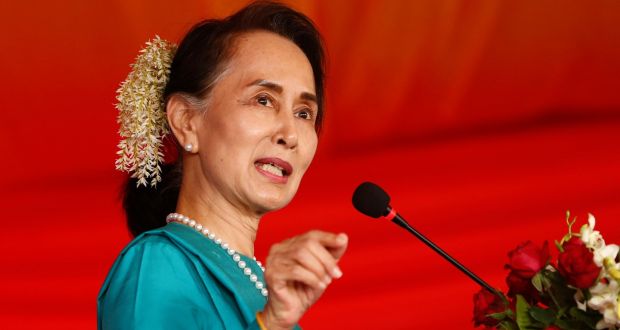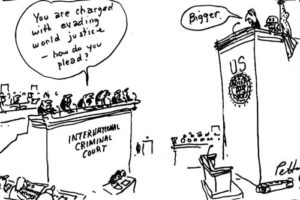Outstanding Upstander Award presented to Dr. Taner Akçam
May 14, 2018
Standing Up against Genocide Denial: Remarks by Dr. Akçam
Friends, thank you for the invitation to return to Minnesota, where I spent several rewarding years as a visiting professor. During my time at the University of Minnesota, I worked with outstanding colleagues in the History Department and at the Center for Holocaust and Genocide Studies. It is wonderful to be back at the invitation of World Without Genocide. I am honored and humbled that I was selected as the recipient of this year’s Upstander Award for my contributions to documenting the 1915 Ottoman Genocide against Armenians, Assyrians, and other Christian minorities. It is gratifying to find myself added to a list of distinguished honorees.
Yet while I accept this honor with gratitude, I wish to share it with those who truly deserve it. And so I dedicate my Upstander award to the brave men and women who were taken into police custody, harassed, and beaten when they gathered in İstanbul to commemorate the Armenian Genocide earlier this year. Their persistence in fighting for recognition of the Armenian genocide is admirable. The harsh treatment they faced as a result of their courageous actions demonstrates why we MUST remember past atrocities. Acknowledging historic crimes is a fundamental part of the continuing struggle for justice, democracy, and human rights.
Today, as we gather to honor the imperative of standing up to genocide, crackdowns on speech, the press, and academic freedom plague Turkey. These undemocratic restrictions on speech and historical inquiry are directly connected to denial and make genocide all the more likely to reocurr. Why? Because regimes that engage in denial lack the moral authority to fight racisim and intolerance and to prevent mass atrocities.
Our shared purpose is to prevent further genocides and mass atrocities in the world. Yet we have neglected a serious aspect of genocide prevention, namely the fight against denial. Even a passing glance in the existing prevention literature reveals the lack of attention to combating denial and its significance in reducing further mass crimes. Denial and prevention are strongly linked and the fight against denialism needs to become a more significant part of efforts to address genocide. We don’t see the causality between the fight against denialism and prevention because of a mind-set, a logic that I call temporal compartmentalization. We pay lip service to the idea of genocide recognition but it is a bit like attending church services. We may genuinely repent our sins on Sunday but go back to sinning on Monday. That is plain wrong and must change.
You may wonder how denial continues to flourish in the 21st century when the internet makes information so readily available. Before the emergence of so-called “fake news,” we imagined that it was easy to distinguish truth from falsehood. Yet, despite assaults on truth, most of us still trust that history rests upon established facts, over which there is a consensus. Facts are based upon certainties that are not open to opinion or interpretation and “denial” is simply a refusal to accept these recognized facts. Opposing denial is therefore a matter of standing up to the truth and calling out lies.
Sadly, this is not true. Rather, a nebulous territory exists between facts and truth AND denialism germinates from this territory. Denialism marshals its own “facts” and lays claim to its own “truth telling.” Denialism offers a different approach to history and for this purpose it creates its own facts. And at the end of the day, the thing that we call “truth” is made to appear as nothing more than our own version of history. What denialism aims to do is to create an atmosphere in which two contradicting versions of history allegedly exist. Over the past decades, those who abide by the dictum, “everyone is entitled to his own opinion, but not to his own facts,” have followed the public and historical debates over the Armenian Genocide with disbelief. Consecutive Turkish governments have succeeded in creating their own version of history with their own documentary evidence, selectively pulled from Turkish archives. They raised their viewpoint to the level of reasonable historical possibility.
Turkish denialism has effectively “held history hostage” by offering the possibility of an alternative set of facts. In the end, honest academic research might have successfully established the unbiased truth; however, in the public of politics, POWER has determined its own truth. The biggest difference between Holocaust denial and Armenian Genocide denial is this very factor. Holocaust denial remains on the fringe, for the most part, while Armenian Genocide denial has been exploited for political purposes. Turkey’s denialist policies have received tremendous support, especially from the U.S., England and Israel. And these countries have helped to ensure that denialism continues, which weakens their ability to stand up to present-day atrocities. Moreover, they are morally compromised as a result of their distinct national histories. The U.S. engages in denial about Native American Genocide and the legacy of mass violence from the history of slavery. The U.K. has not fully come to terms with the ill effects of colonialism. And Israel will have to face its own history regarding the treatement of Palestinians. Strong nations maintain their power structures through the refusal to acknowledge complicated histories. Yet this is precisely what weakens their standing when it comes to genocide prevention. Only a full reckoning with the past would strengthen their efforts to prevent future mass atrocities and genocide. As long as they uphold the politics of denial, they acquiese to violence rather than contribute to prevention.
There are two additional misperceptions regarding genocide denial and, especially, Turkish denialism, which creates major obstacle in fighting denialism and so to prevent further mass attrocities. Firstly, denial is often regarded as a mistaken but tolerable ideological attitude toward mass atrocities. The second misunderstanding is related to the first and assumes that confronting denial is about establishing a “moral” attitude towards a single crime that remains forgotten in the pages of history. Any connection with the present is effectively walled off. These misperceptions are a logical consequence of what I call temporal compartmentalization: namely, the tendency to place the past and present into different boxes and to ignore their interconnectedness. It is impossible to sever the ties between denial and contemporary political problems. Denial is not only about an ideological attitude towards the past nor is the demand for recognition of historical crimes confined to a moral conviction regarding past events [that can be atoned for in Sunday church services].
Denialism is a structure that cannot simply be relegated to past atrocities. The denialist structure produced and continues to foster policies in the present day. In this regard, it would be appropriate and reasonable to compare Turkish denialism with the racist apartheid regime of South Africa. The system, mindset, and institutions of apartheid were constructed upon racial differences; denial of the Armenian genocide has similar roots. It was manufactured upon the discrimination and exclusion of ethnic-religious minorities and considers the democratic demands of these groups a national security threat that has to be eliminated.
In the past, the so called “Armenian question” was the result of Armenian requests for equality and social reform, which arguably would have led to a better and stronger Ottoman society. It is no different for Kurds today. Like the Armenians of the late Ottoman period, the Kurds demand social and political reforms. Granting these basic rights could be the foundation for a democratic Turkey. In the past, Armenian demands and the Armenians themselves were considered security threats, which caused them to become targets for massacres and Genocide. Today, Kurds are facing the same fate. Denying the truth about the Armenian genocide and suppressing basic democratic rights of Kurds and other ethnic-religious minorities constitute the foundation of the Turkish concept of security. Once again, democratic demands for truth and justice and the request for basic democratic rights, such as equality under the law, social reform and freedom of speech are considered threats to national security.
The picture is very clear: by denying what happened in 1915, Turkey reproduces the institutions, social relations, and mindset that created the events of 1915 in the first place. Denial is not simply a defense of an old regime (Ottoman Empire). Denial also fuels the politics of continuing aggression, both inside against the ethnic-religious minorities and democratic opposition and outside against the neigbors of Turkey today.
There is a strong interconnectedness between denial of past atrocities, policies that trample on basic democratic and human rights, and violence against civilians in the region. The highest constitutional institution in Turkey, the National Security Council, is the symbol of this interconnectedness. In 2001, this supreme constitutional authority established a “Coordinating Committee for the Fight Against Baseless Claims of Genocide.” All of the important ministries, including the Armed Forces, are represented on this committee, which is chaired by the Vice Prime Minister. The sole mission of this institution is to fight those who demand recognition of mass-atrocities, including the Armenian genocide, committed by successive Ottoman-Turkish governments. It is not a coincidence that it is the same institution that considers the democratic demands of Kurds and other minorities and regional developments in Syria to be a national security threat.
My view of this correlation is simple: as long as Turkey continues to regard facing history with honesty and acknowledgment of wrongdoings as national security threats and refuses to come to terms with the past for national security reasons, further security problems will ensue. As we see, denialism is not a mistaken but tolerable ideological attitude toward mass atrocities. And so, the recognition of the Armenian genocide is not a thing of the past that can be forgotten when confronted with the seemingly more pressing issues of today. On the contrary, it is the key to solving contemporary security problems.
This brings me to my next point: there is a widely accepted opinion, which contends that while resisting denial and demanding the recognition of a historic crime might be a meaningful and amiable moral attitude, however, we must be realistic and prioritize the more crucial and compelling security and national interests of contemporary states. Accordingly, in situations where the recognition of an historic crime is in conflict with the national interests and security of today, it is meaningless and nonsensical to maintain the demand for recognition because the event in question has long passed. To insist on it, represents a fundamental moralist attitude.
The discussions within the West, and especially in the United States, regarding the 1915 genocide and relations with Turkey are generally conducted within this framework of realpolitik. According to this perspective, the “national security concerns” of the West (the USA, Great Britain, France, Germany, etc.) in the Middle East are placed on one side, while the recognition of a 100-year-old genocide is placed on the other. And for this reason, instead of pressuring Turkey into changing its denialist policies towards 1915, for decades these countries have opted to support Turkey. Today, it is hard to find any member of the American Congress who contests the fact of the Armenian genocide. But this very same Congress still – to this day – denies recognition of the Armenian genocide solely because they pit “national interest” against “morality” as two mutually exclusive positions. This is plain wrong.
As recent developments clearly demonstrate, there is a strong relationship between security, democracy, and facing history in the Middle East. Even a passing glance at the region makes it clear that historical injustices and the persistent denial of these injustices by one or another state or ethnic-religious group is a major stumbling block, not only for the democratization of the region, but also for the establishment of stable relations between different ethnic and religious groups. You cannot solve any problem in the Middle East today without addressing historic wrongs because history is not something in the past; in the Middle East, the past IS the present.
Put another way, one of the main problems in the region is the insecurity felt by different groups and states towards each other as a result of past history. When persistent denial of these pain-filled acts is fundamental to your security policy, feelings of insecurity towards the other become inevitable. This is what we call the security dilemma: What one does to enhance one’s own security causes a reaction that, in the end, can make one even less secure. For this reason, any security concept, any policies of realpolitik that obfuscates past atrocities and ignores addressing these historic wrongs, is doomed to fail.
We must cease this senseless distinction and compartmentalization between the recognition of 1915 and contemporary realpolitik. Until today, the West has failed to recognize 1915 for reasons either of “security” or “national interest,” even in cases where it adopted some affectatious parliamentary decisions, continued to carry out policies that gave support and political cover to Turkey. If democracy, peace, and security are the objectives – the end-goals – of the policy of the West towards Middle East, this approach to foreign policy must change.
For it is this attitude and behavior of the West that emboldens Turkey to continue its denial of 1915 and encourages it to persist with its policies that threaten democracy, peace, and security in the region today.
Let us not forget – denial of the past is not exclusive to Turkey and its history. It is the collective and fundamental problem of United States with regard to its regional peace and security. If we do not place the struggle to face our past and fight against denialism at the center of our politics, we not only fail today, but we also risk losing our future. There is no difference between fighting Turkish Denialism and fighting the South African Apartheid regime. Apartheid didn’t collapse from internal pressure alone. The support of the international community was essential. I appeal to you from this podium today to end this detrimental compartmentalization between past and present and to grasp the severity and magnitude of Denialism’s impact.
A thorough and honest acknowledgment of a heinous crime perpetrated in the past cannot be accomplished in a Sunday church service. If we seek to respect the dignity of victims of past crimes; to establish justice; to create democracy, peace, and stability in the world; if we want to stand up against mass atrocities and prevent future genocides, we must fight denialism not only as an attitude towards a past crime but also as a crime against human dignity today…
Thank you for listening.







